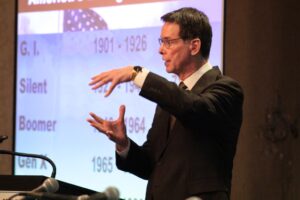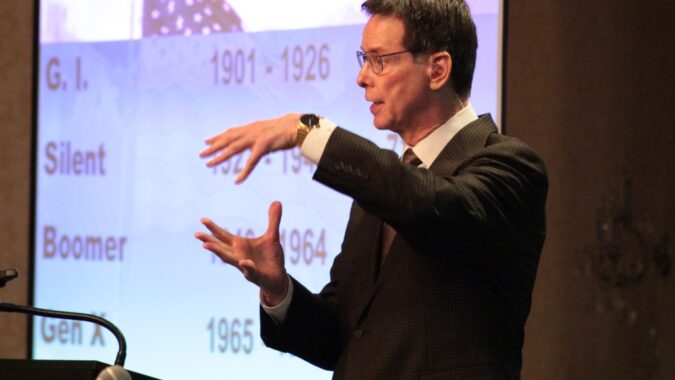
Chuck Underwood, founder and principal of The Generational Imperative Inc., is one of a handful of people who pioneered generational studies in the 1980s.
We live in a unique era: Life expectancy and societal change have produced five generations of adults living and working together in America—each with its own characteristics, its own values, and its own way of looking at the world.
This presents unique challenges to business as the youngest generation, the millennials, establishes their careers and families.
Fortunately, the relatively new field of generational studies can help make sense of it and in turn help businesses meet those challenges. Chuck Underwood is one of a handful of people who pioneered generational studies in the 1980s and has seen it go from 15 years of
obscurity to being an imperative for the 21st century.
“The decade of the 2000s will always be the decade in which generational study and generational strategies fully emerged to prove their value, and permanent value at that,” Underwood told the crowd at NJBIA’s March 21 “Education Equation: Strategies for Retaining New Jersey’s Future Workforce.”
Understanding Generational Study
Speaking to a crowd of about 140, Underwood offered a number of practical tips on marketing to millennial customers and managing millennial employees. But before businesses and educators could understand how to use them, Underwood first had to walk them through the basics of generational strategies.
He said, “The bottom line of generational strategies is this: If we understand what happened to each generation during its formative years, we can then make sense of the powerhouse core values that guide that generation’s minute-by-minute, month-by-month, lifelong decision making. And when we are armed with that powerful information, we can then fully connect with each generation in the workplace, in the marketplace, in our living rooms at home, in the classrooms, and down at the corner tavern.”
Different generations are defined by a common set of core values formed from birth to age 18, Underwood said. Those core values are shaped by the historic events and upbringing they experienced as children. By Underwood’s definition, individuals do not become part of a generation until they graduate high school, so in his view, there is no Generation Z, at least not for generational strategy purposes.
So that leaves these five generations:
- The G.I. Generation, born in the beginning of the 20th century and becoming adults during WWII;
- The Silent Generation, born between 1927 and 1945, and coming of age in the post-war economic expansion;
- Baby Boomers, born 1946 to 1964 and most associated with the 60s era;
- Generation X, born between 1965 and 1981; and
- Millennials, born between 1982 and 1998, and possibly still growing.
Understanding Millennials
Each generation has good and bad characteristics. One important thing to know about millennials is they think big and dream big, Underwood said. Employers can expect them to have what Underwood calls wildly unrealistic expectations about job advancement and salary, but that same trait means marketing to millennials should be bold, big and noisy.
Millennials also look to their elders for guidance. They revere the wisdom of older adults and have a close relationship with their parents, to the point where parents are their best friends and confidants.
Any effective marketing to millennials—whether to buy products or come to work for a business—should have a multi-generational viewpoint, Underwood says, because millennials will likely ask people from the older generation for their opinions and guidance.
“Colleges and universities have learned to include mom and dad much more intimately than past generations in the recruitment materials,” Underwood said. “The same is true with smart employers, who home in on that single millennial core value of involving their parents in their career decisions.”
Millennials also want an entrepreneurial environment, but that does not mean they want to start their own businesses. Millennials are looking to have meaningful input on projects and to be a part of something.
“They want an entrepreneurial culture that is very sophisticated in its sense of organization for pulling in new ideas from everybody, genuinely considering them, and being nimble enough to implement the good ideas rapidly,” Underwood said.
Underwood is optimistic about the future and believes millennials will eventually contribute a great deal to society, but until then the process of adjusting to different generations, whether in the workplace or elsewhere, is going to be a bumpy one.
Chuck Underwood is the founder and principal of the consulting firm The Generational Imperative Inc. and a pioneer in the field of generational study. He provides consulting on generational business for Hewlett-Packard, Procter & Gamble, Coca Cola and hundreds of other companies.

